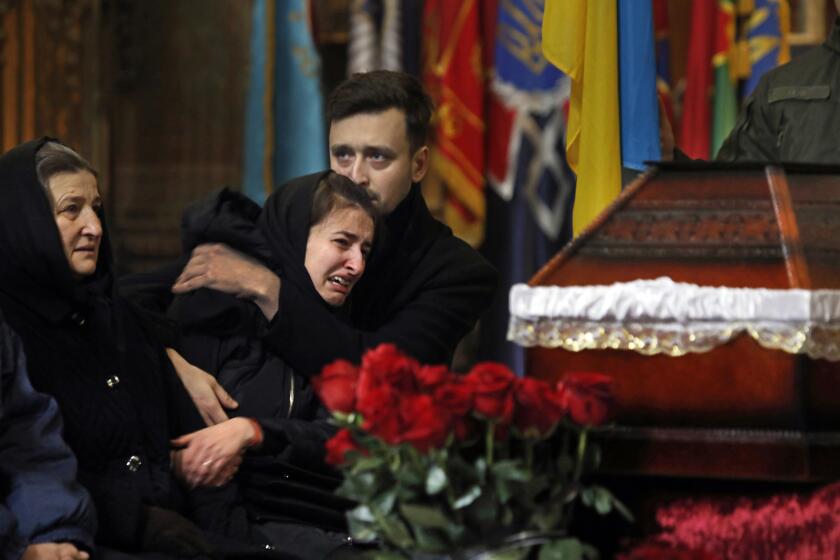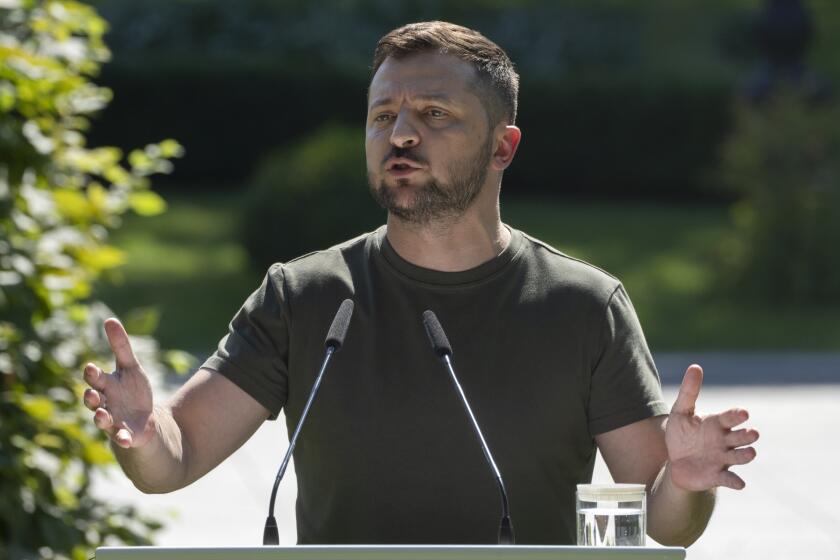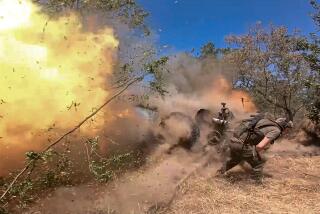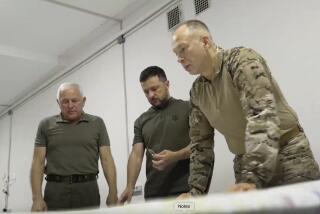Ukraine works to stabilize Kherson after Russian pullout
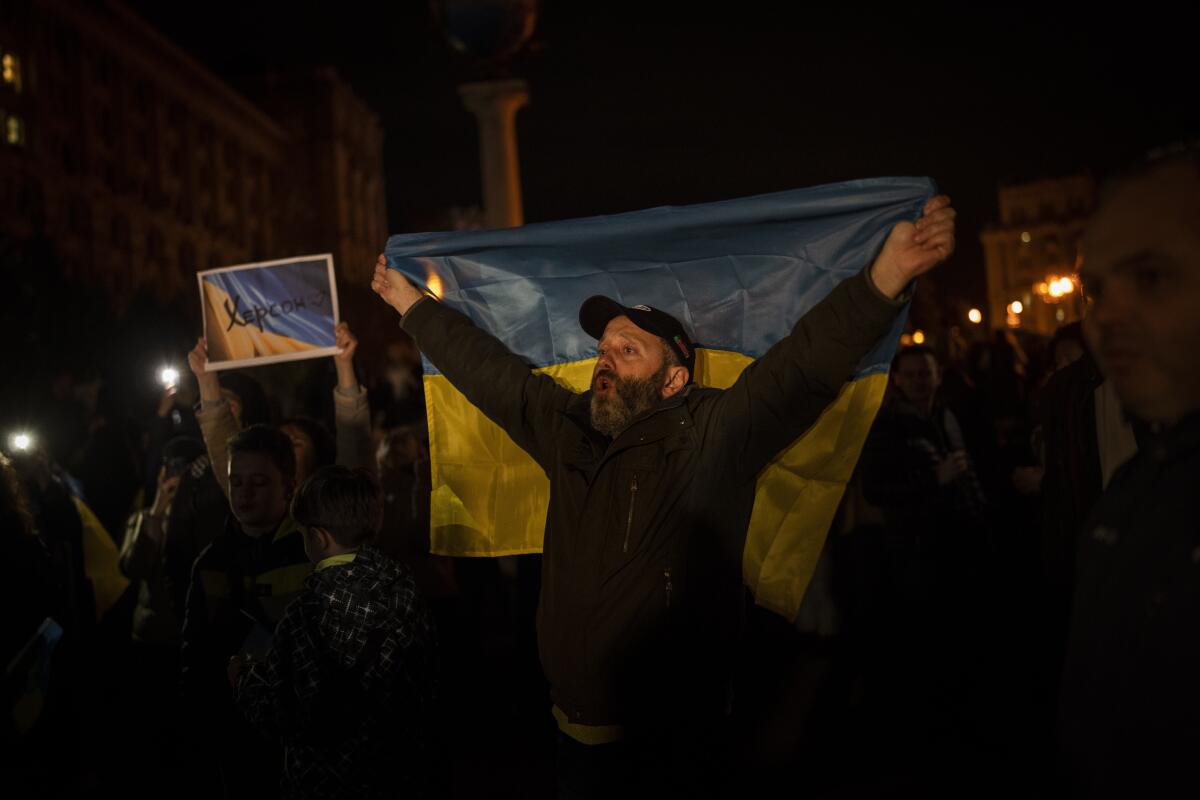
- Share via
MYKOLAIV, Ukraine — Ukrainian police officers returned Saturday, along with TV and radio services, to the southern city of Kherson following the withdrawal of Russian troops, part of fast but cautious efforts to make the only regional capital captured by Russia livable after months of occupation. Yet one official still described the city as “a humanitarian catastrophe.”
People across Ukraine awoke from a night of jubilant celebrating after the Kremlin announced that its troops had withdrawn to the other side of the Dnieper River from Kherson. The Ukrainian military said it was overseeing “stabilization measures” around the city to make sure it was safe.
The Russian retreat represented a significant setback for the Kremlin some six weeks after Russian President Vladimir Putin annexed the Kherson region and three other provinces
in southern and eastern Ukraine in breach of inter-national law and declared them Russian territory.
The head of Ukraine’s national police, Ihor Klymenko, said Saturday on Facebook that about 200 officers were at work in the city, setting up checkpoints and documenting evidence of possible war crimes. Police teams also were working to identify and neutralize unexploded ordnance, and one sapper was wounded Saturday while de-mining an administrative building, Klymenko said.
Ukraine’s communications watchdog said national TV and radio broadcasts had resumed and an advisor to Kherson’s mayor said humanitarian aid and supplies had begun to arrive from the neighboring Mykolaiv region.
But the advisor, Roman Holovnya, described the situation in Kherson as “a humanitarian catastrophe.” He said the remaining residents lacked water, medicine and food — and basics like bread went unbaked because of a lack of electricity.
“The occupiers and collaborators did everything possible so that those people who remained in the city suffered as much as possible over those days, weeks, months of waiting” for Ukraine’s forces to arrive, Holovnya said. “Water supplies are practically nonexistent.”
The chairman of Khersonoblenergo, the region’s prewar power provider, said electricity was being returned “to every settlement in the Kherson region immediately after the liberation.”
Despite the efforts to restore normal civilian life, Russian forces remain close by. The Ukrainian military’s general staff said Saturday that the Russians were fortifying their battle lines on the river’s eastern bank after abandoning the capital. About 70% of the Kherson region still remains under Russian control.
President Volodymyr Zelensky said in his nightly video address Saturday that Ukrainian forces have established control of more than 60 settlements in the Kherson region and “stabilization measures are also ongoing in Kherson itself.”
“Everywhere in the liberated territory, our explosives technicians have a lot of work to do. Almost 2,000 explosive items have already been removed,” Zelensky said. “Before fleeing from Kherson, the occupiers destroyed all critical infrastructure — communication, water supply, heat, electricity.”
Photos on social media Saturday showed Ukrainian activists removing memorial plaques put up by the occupation authorities the Kremlin installed to run the Kherson region. A Telegram post showed two people in a park taking down plaques picturing Soviet-era military figures.
Moscow’s announcement that Russian forces were withdrawing across the Dnieper River, which divides both the Kherson region and Ukraine, followed a stepped-up Ukrainian counteroffensive in the country’s south. In the last two months, Ukraine’s military claimed to have retaken dozens of towns and villages north of the city of Kherson, and the military said that’s where stabilization activities were taking place.
The Russian state news agency Tass quoted an official in Kherson’s Kremlin-appointed administration Saturday as saying that Henichesk, a city on the Azov Sea about 125 miles southeast of Kherson, would now serve as the region’s “temporary capital.”
Ukrainian media derided the announcement, with the Ukrainska Pravda newspaper saying Russia “had made up a new capital” for the region.
Across much of Ukraine, moments of jubilation marked the exit of Russian forces, since a retreat from Kherson and other areas on the Dnieper’s west bank would appear to shatter Russian hopes of pressing an offensive west to Mykolaiv and Odesa to cut off Ukraine’s access to the Black Sea.
In Odesa, residents draped themselves in Ukraine’s blue-and-yellow flags, shared Champagne and held up flag-colored cards with the word “Kherson” on them.
But like Zelensky, Ukrainian Foreign Minister Dmytro Kuleba sought to temper the excitement.
“We are winning battles on the ground, but the war continues,” he said from Cambodia, where he was attending a meeting of the Assn. of Southeast Asian Nations.
Kuleba brought up the prospect of the Ukrainian army finding evidence of possible Russian war crimes in Kherson, just as it did after Russian pullbacks in the Kyiv and Kharkiv regions.
“Every time we liberate a piece of our territory, when we enter a city liberated from Russian army, we find torture rooms and mass graves with civilians tortured and murdered by Russian army in the course of the occupation,” Ukraine’s top diplomat said. “It’s not easy to speak with people like this. But I said that every war ends with diplomacy and Russia has to approach talks in good faith.”
U.S. assessments last week showed Russia’s war in Ukraine may already have killed or wounded tens of thousands of civilians and hundreds of thousands of soldiers.
Elsewhere, Russia continued its grinding offensive in Ukraine’s industrial east, targeting the city of Bakhmut in the Donetsk region, the Ukrainian military’s General Staff said.
The Times’ Carolyn Cole is on the ground in Ukraine as residents prepare for winter’s cold amid Russian missile strikes against the nation’s infrastructure.
Donetsk Gov. Pavlo Kyrylenko reported Saturday that two civilians were killed and four wounded over the last day as battles heated up around Bakhmut and Avdiivka, a small city that has remained in Ukrainian hands.
Russia’s push to capture Bakhmut demonstrates its desire for visible gains following weeks of setbacks. It would also pave the way to move onto other Ukrainian strongholds in the heavily contested Donetsk region.
In the Dnipropetrovsk region west of Donetsk, Russia troops again shelled communities near the Zaporizhzhia nuclear power plant, the Ukrainian regional governor said.
Ukraine’s president has hinted at the possibility of peace talks with Russia, but his preconditions would appear to be nonstarters for the Kremlin.
More to Read
Sign up for Essential California
The most important California stories and recommendations in your inbox every morning.
You may occasionally receive promotional content from the Los Angeles Times.
